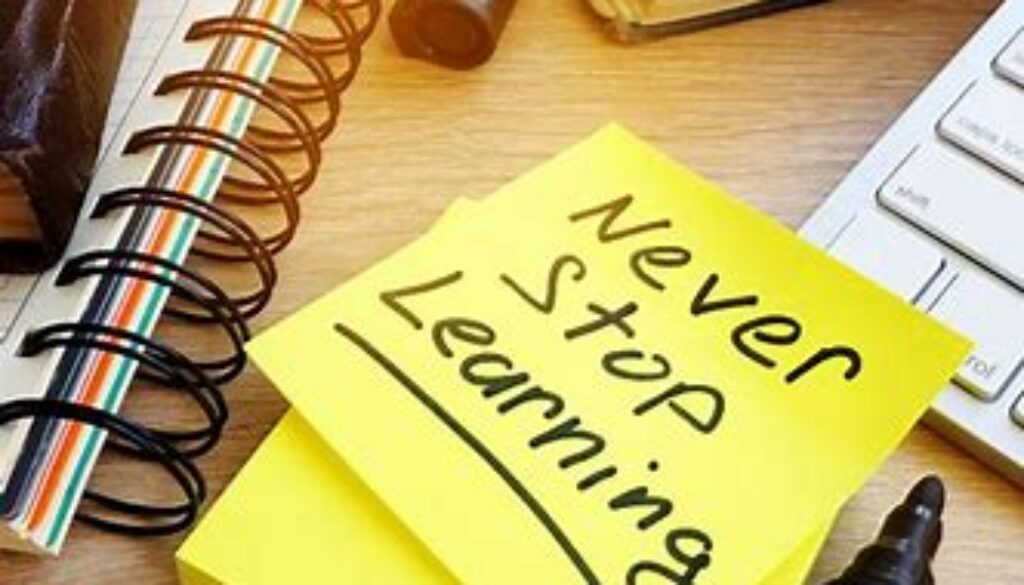Lifelong Learning
Menanteau Serfontein – 20 May 2021
 “The education of a man is never completed until he dies.”
“The education of a man is never completed until he dies.”
― Robert E. Lee
 “Anyone who stops learning is old, whether at twenty or eighty. Anyone who keeps learning stays young.”
“Anyone who stops learning is old, whether at twenty or eighty. Anyone who keeps learning stays young.”
― Henry Ford
Many people get to a point in their lives where they feel that they have acquired all the necessary knowledge and skills that are required to sustain them for the rest of their work career and their personal lives. In view of this, they tend to avoid making the effort to obtain new knowledge and skills. This mindset is in direct contradiction with the concept of Lifelong Learning and the people who are trapped in this way of thinking will stagnate and eventually start going backwards, ending up being “old before their age”.
What is Lifelong Learning?
Lifelong learning is the ongoing, voluntary, self-motivated and self-initiated pursuit of gaining new knowledge and learning new skills/competencies throughout your life. Such learning and training occurs through formal educational and training institutions, but to an increasing extent, it occurs informally and through self-taught processes. This is pursued not only for professional and career purposes, but also for personal development and fulfilment for its own sake.
The principle of Lifelong learning could apply to all people at all ages. This includes people during their professional and business careers as well as those who have retired from full-time employment.
Why is Lifelong Learning Necessary?
Keith Keating, the Senior Director of Global Learning Strategies at GP Strategies Corp., states that for those who are employed or active in business, the question is whether you will rise to the challenge of learning what it takes to stay relevant and employed. When you become a lifelong learner and focus on continual learning of new, in-demand skills, you claim the power to face the future of work successfully.
 “Working life has extended so much in the last fifty years that it exceeds life expectancy of even the most successful businesses. Very few businesses are successful for more than 25 or 30 years. And yet most educated people who go to work in their early twenties will keep working until they are 70. And so they had better be prepared for a second career whether it’s in another organization where they are doing what they have been doing or in a new line of work. They must be prepared to learn again. They must be prepared to position themselves. They must be prepared to want to learn – to see it not as something they have to do, but as something they enjoy doing. They will have to learn how to learn.”
“Working life has extended so much in the last fifty years that it exceeds life expectancy of even the most successful businesses. Very few businesses are successful for more than 25 or 30 years. And yet most educated people who go to work in their early twenties will keep working until they are 70. And so they had better be prepared for a second career whether it’s in another organization where they are doing what they have been doing or in a new line of work. They must be prepared to learn again. They must be prepared to position themselves. They must be prepared to want to learn – to see it not as something they have to do, but as something they enjoy doing. They will have to learn how to learn.”
― Peter Drucker, Management Consultant, Educator, and Author, whose writings contributed significantly to the philosophical and practical foundations of the modern business corporation.
What Does it Mean to Be a Lifelong Learner?
Keating says that we should abandon the commonly held notion that learning is for children and young adults. You graduate from high school, get a university degree or complete an apprenticeship and consider yourself done with education and training. In the past, this may have been sufficient to land and keep a great job until you retire. But the concept of being a learner has shifted. No more is the concept learn, do, retire. To be agile and adaptable, you need to learn, do, unlearn — learn, do, rest — learn, do, unlearn — repeat.
 “The illiterate of the 21st century will not be those who cannot read and write, but those who cannot learn, unlearn, and relearn. ”
“The illiterate of the 21st century will not be those who cannot read and write, but those who cannot learn, unlearn, and relearn. ”
― Alvin Toffler, Futurist
Modern careers are like non-stop conveyor belts — you need to keep moving and learning no matter what the stage of your career. Being content and resting on our laurels is a mindset that puts us at risk. Consider how quickly industry, business and technology evolve — this is how our employees get left behind. Instilling lifelong learning ensures talent remains agile, adaptable and ready to fill the next organizational gap.
In today’s work climate, lifelong learning paves the way for current and future success.
In the most basic terms, a lifelong learner is someone who keeps acquiring new skills and capabilities well past their formal education years. It involves not only studying new topics but also developing an open-minded, positive attitude about the dynamic nature of the world. Personal development continues alongside professional development.
A lifelong learner looks for opportunities to expand their knowledge and understanding. While qualifications help with a career, curiosity and a growth mindset invites future possibilities.
Why is Lifelong Learning Important Now (More than Ever Before)?
Keating goes on to say that the labour market has changed considerably in the past decade or so. Increased digitalization and globalization lead to extreme flexibility when it comes to hiring new talent. Companies choose part-time, project-based independent contractors more than ever before. They shop for workers based on skills rather than official qualifications or job titles.
In addition, employers focus increasingly on attracting talent rather than someone to fill a job. If the same person continues to be agile and adaptable for the long-term due to their focus on lifelong learning, they become a much more valuable asset.
Lifelong learning matters more now than ever, because generic experience and flexibility cannot compete with serial mastery. Even mastering one skill will not ensure employment for the long-term. The shelf-life of skills is reducing year after year. If you abandoned learning after achieving mastery in one thing, you will likewise become useless in the labour force.
These truths hold for both professional and personal development. While career-based learning assists with finding a job or promotion, adopting the same mindset after-hours provides benefits too. Think of personal development as the process of learning anything that strengthens your mind, improves memory and instils higher levels of self-confidence and personal contentment.
Professional development, on the other hand, is learning marketable, transferable skills that boost your value in the workplace. Technology and processes change rapidly these days, and disinterest in learning how to advance your usefulness in your industry translates into disinterest in helping your employer. The outcome? You are first in line for layoffs or downsizing.
If you develop yourself well enough – personally and professionally – and continue to do so for the rest of your life, you (or your brand) become the asset instead of the single skill you have to offer.
The Benefits of Lifelong Learning
Incorporating lifelong learning (knowledge and skills) into your life can offer many long-term benefits, including:
- While we’re busy learning a new skill or acquiring new knowledge, we’re also building other valuable skills that can help us in our personal and professional lives. This is because we utilize different skills and areas of the brain in order to learn something new.
- It contributes to improved quality of life as well as self-confidence and self-reliance.
- It will enable you to keep up with the exponential changes in digital technology and become sufficiently “tech savvy”. If you don’t, you run the risk of becoming ignorant, helpless and lonely in the world of the 4th Industrial Revolution (4IR) and Artificial Intelligence (AI). We all know of people who were (and remain) unwilling to make the effort to acquire new knowledge and skills to participate meaningfully in the modern world characterized by digital technology. These people have become unable to make productive and effective use of the internet, digital communication facilities such as email, digital media, holding online meetings on digital platforms, online banking, online purchases, online registrations and bookings, paperless filing, etc.
How to Become a Lifelong Learner
Merely understanding the benefits of professional and personal development throughout your life does little if you cannot effectively apply methods to become a lifelong learner. The process involves attitude adjustments, commitment, self-motivation, taking personal responsibility, dedication and sustained effort, giving you the best chance of remaining relevant in the face of sweeping and swift changes throughout the world of work.
- Develop a Growth Mindset
Research into IQ and neuroscience shows that lifelong growth and improvement has been proven scientifically to be highly beneficial.
A growth mindset embraces the inevitability of change and the concomitant necessity to keep acquiring relevant new knowledge and skills.
Too many people still focus on an end goal where they can finally say, “I’ve arrived,” prop their feet up on the desk and float toward retirement. This comfort zone gives a false sense of security, which you have to push beyond to become a lifelong learner. Contentment is the enemy of success when things change so rapidly across the majority of industries.
As computers, artificial intelligence (AI) systems, robotics and other machines get smarter and more capable, human workers have to do the same to stay relevant and employed. As a lifelong learner, you can excel at both professional and personal development as well as growth to make yourself invaluable in your chosen field and to open doors to new roles and responsibilities.
Lifelong learners prosper in this new, increasingly flexible and dynamic global economy. Lifelong learners invent and reinvent themselves whenever they find or create the opportunity. This is not about job-hopping. It is about ensuring you can continue to contribute meaningfully in your current role and position yourself as a valuable asset if you do have to find a new one.
- Take Personal Responsibility for Your Future
Too many adults blame the educational system, their industry, the government or chance for their personal stagnation and career struggles. Instead you should take responsibility and own your decisions, actions and future results and thereby giving yourself the power to make changes, independent of whatever happened to you in the past.
Lifelong learners seek out opportunities for their benefit and growth, because they understand that they have the power and responsibility to mould their progress.
Proactive knowledge and skills acquisition is an essential part of the “learning, doing, unlearning and learning more” lifecycle.
Fitting new learning goals into your busy life takes consideration, commitment, perseverance and sustained effort. If you don’t make time and space for it, it won’t happen.
Examples of ways to acquire new knowledge and skills
Self-initiated learning can take place through a vast array of methods, e.g. reading, researching and studying chosen topics, learning new skills and competencies by learning how to perform the new skill and then practising it until you become competent at it. A large amount of information and learning material can be found on the internet, videos, talks, podcasts, etc. A tremendous amount of incidental learning takes place through the process of finding what you are looking for and by experimentation.
Continuous learning should become a way of life.
Examples of the types of personal development initiatives that could form part of your lifelong learning journey (for its own sake)
- Developing a new skill in something you are interested in (eg. sewing, cooking, programming, writing, public speaking, playing bridge, etc)
- Self-taught study (e.g. learning a new language, researching topics of interest, reading up on changes and new developments)
- Learning a new sport or activity (e.g. cycling, hiking, learning to ski, learning to swim, learning to sail, learning to play a musical instrument)
- Learning to use “new technology facilities” (e.g. smart devices, new software applications)
- Formal education via online education or classroom-based courses
Conclusion
I strongly believe that it is essential for the concept of lifelong learning to become entrenched at school level and all spheres of society. In an Article by Caroline Vander Ark and Mary Ryerse entitled “10 Reasons Why Lifelong Learning is the Only Option”, they state that health research has pointed to lifelong learning as one of the best ways for seniors to stay healthy and that an active mind throughout your life has been proven to help you to enhance your quality of life.
Some of the content of this Article was derived from the following sources:
- Article entitled “The Mindset of a Lifelong Learner” by Keith Keating, Contained in Chief Learning Officer https://www.chieflearningofficer.com/2020/05/26/the-mindset-of-a-lifelong-learner/
- Article entitled “Lifelong Learning” contained in Alamis https://www.valamis.com/hub/lifelong-learning
- Article entitled “10 Reasons Why Lifelong Learning is the Only Option” by Caroline Vander Arkand Mary Ryerse contained in Getting Smart https://www.gettingsmart.com/2017/01/10-reasons-why-lifelong-learning-is-the-only-option/






